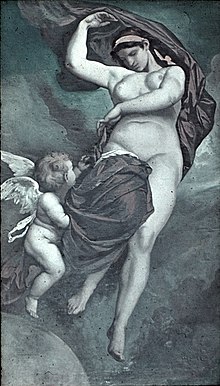Gaia (mythology)
| Gaia | |
|---|---|
| Primordial Deity of the Earth | |

Gaia, by Anselm Feuerbach (1875)
|
|
| Abode | Earth |
| Consort | Uranus, Pontus, Aether and Tartarus |
| Parents | None or Chaos (Hesiod), or Aether and Hemera (Hyginus) |
| Children | Uranus, Pontus, the Ourea, Hecatonchires, Cyclopes, Titans, The Gigantes, Nereus, Thaumus, Phorcys, Ceto, Eurybia, Aergia, Typhon, and Python |
| Roman equivalent | Terra |
In Greek mythology, Gaia (/ˈɡeɪ.ə/ or /ˈɡaɪ.ə/ from Ancient Greek Γαῖα, a poetical form of Γῆ Gē, "land" or "earth") also spelled Gaea, is the personification of the Earth and one of the Greek primordial deities. Gaia is the ancestral mother of all life: the primal Mother Earth goddess. She is the immediate parent of Uranus (the sky), from whose sexual union she bore the Titans (themselves parents of many of the Olympian gods) and the Giants, and of Pontus (the sea), from whose union she bore the primordial sea gods. Her equivalent in the Roman pantheon was Terra.
The Greek word γαῖα (transliterated as gaia) is a collateral form of γῆ (gē, Doric γᾶ ga and probably δᾶ da) meaning Earth, a word of uncertain origin.R. S. P. Beekes has suggested a Pre-Greek origin. It, however, could be related to the Avestan word gaiia 'life;' cf. Av. gaēθā '(material) world, totality of creatures' and gaēθiia 'belonging to/residing in the worldly/material sphere, material'; or perhaps Av, gairi 'mountain'.
...
Wikipedia
